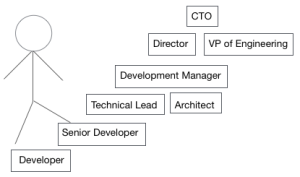How to Level Up
I regularly hear from and read about technologists in a career rut. Unless one is both lucky and adept at predicting the future, experiencing some temporary stall can happen to professionals at any career stage. It may be the feeling of being stuck in an unchallenging role, feeling burdened by an undesirable skill set, or trapped in a company that seems difficult to escape.
Career stagnation in technology could be defined as a prolonged period characterized by limited project variety, no advancement or even lateral movement, few tangible accomplishments, and little exposure to any emerging trends. Some managers are aware that workers in these situations generally leave, so the managers may proactively try to satisfy staff by shuffling teams and providing more interesting tasks. Many managers have to focus on deliverables and may give little thought to the career development of their charges, perhaps throwing money at retention problems instead of providing challenges.
To “level up” could mean a promotion into management or technical leadership, a new start at a firm with increased opportunity, a role with autonomy and decision-making responsibility, or the ability to make significant improvements to skills and marketability. People that think about the leveling up concept often know what they want (or sometimes what they don’t want), but don’t necessarily see the best paths to get there.
Leverage the skills you have to get the skills you want
Most professionals view their current skills as a means to getting new jobs, but it’s useful to also think about skills as the key to acquiring other new skills. This tactic is most relevant when a skill set is dated and a previously strong marketability level is now questionable. Some will attempt to make a clean and immediate break from their old technologies or responsibilities into the new, usually with mixed results.
As an example, many COBOL programmers tried to enter the stronger Java job market following Y2K. Some applied to jobs with no Java experience hoping their COBOL years would be deemed transferrable, while others pursued certifications and self-study to ideally be viewed as a somewhat “experienced” hire. One overlooked strategy was to approach companies that were using both COBOL and Java in some capacity, with the understanding that the candidate was willing to write COBOL if provided the ability to also work with Java.
Most job seeking technologists have at least one ability that will help them contribute immediately to any other team or organization. It could be an obscure technical skill, leadership experience, or domain knowledge. Even if the skill is not something the person wants to use forever, it could be a key component to getting hired. Try to identify companies that may be looking for some specific expertise you can provide, even if it isn’t the most attractive tool in your bag, and be transparent about your willingness to do that less desirable work in exchange for exposure to skills that are in demand.
DIY
For those in the most stagnant of technical environments, taking on independent projects or open source may be the best way to gain experience and increase marketability. It’s usually preferable to learn new things on the job (because money), but being proactive about your career and keeping abreast of current marketable technologies will also show initiative to potential employers. The level up from personal projects almost always comes from an employment change.
Sometimes to level up you need to take a step back – or sideways
Careers aren’t always linear, and the expectation that trajectory needs to follow a strict continuous and incremental level of responsibilities is perhaps naive and potentially dangerous. Job seekers are often prone to placing too much weight on a position’s salary or (gasp) title without fully considering the position’s potential opportunity as it relates to future marketability and career development. Somewhat frequent movement between jobs is accepted in our industry, so positions can be viewed as stepping stones to future opportunities.
When evaluating new roles, whether with a current employer or another firm, imagine what a three or four year tenure in that role at that company will look like on future résumés. Will the skills likely to be acquired or improved in that role be marketable and transferrable to other firms? Accepting positions that come with lateral responsibility and compensation is usually a wise long-term decision when provided a more favorable learning and growth environment.
| Reference: | How to Level Up from our JCG partner Dave Fecak at the Job Tips For Geeks blog. |






